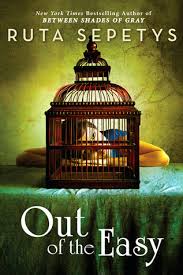
The power of historical fiction is demonstrated when an author can transport the reader into the sensibility of another time. All three of these books accomplish that goal in a compelling manner.
Come August, Come Freedom by Gigi Amateau (Candlewick, 2012) tells the story of Gabriel Prosser, an African-American slave who organized an uprising in Virginia in 1800. Amateau researched Prosser extensively, then took the pieces she discovered in primary sources and fashioned them into a gripping portrait of a complex man. Who would Gabriel be to take on such a mission in his time and place? What events would take someone from dreaming about freedom to organizing a full-scale rebellion? Amateau creates a believable, thrilling version of events that examines human motivation beyond the bare bones of the court records.

Ruta Sepetys' first book,
Between Shades of Gray, was a outstanding debut. She returns with another historical fiction title, but one that is completely different in setting and tone.
Out of the Easy (Philomel, 2013)
takes us to 1950s New Orleans. Josie Moraine is the daughter of a prostitute. Her part-time job is cleaning up the brothel and doing errands for the madam, Willie. Raised in this world, Josie accepts it but is not eager to embrace it. Sepetys is particularly good in catching the rhythms of her characters. The setting is another star here--the mixture of grit, glamour, truth, and deception that Josie sees each day is unforgettable. Things begin to change when Josie makes a friend who is everything Josie wishes she could be--a college girl with a respectable family. Sepetys' characters are multi-dimensional however, and most are not all good or bad. Discovering the many layers within each person is one of the great pleasures of
Out of the Easy.
 Z: A Novel of Zelda Fitzgerald
Z: A Novel of Zelda Fitzgerald by Therese Ann Fowler (St. Martin's Press, 2013) is a fascinating novelization of Zelda Fitzgerald's life. Fowler takes on some of the criticisms of Zelda--was she really mentally unstable? jealous of her husband, F. Scott Fitzgerald?--and answers with compassion and insight. Maybe Zelda was unfairly criticized by people like Ernest Hemingway. Maybe Scott was jealous of Zelda's abilities. The story is told from Zelda's point of view, so regardless of whether you believe her, the story is always interesting. From her debutante years in Alabama, to New York City, Paris, and other European hot spots,
Z provides a tantalizing glimpse into a glamorous life. To prepare for the new
Great Gatsby movie coming out in May, re-read that novel along with
Z--Lucinda Whitehurst.
 Yaqui Delgado Wants to Kick Your Ass! The title grabs your attention, then the story wins your heart. Meg Medina takes a different direction with her newest title, a contemporary story with none of the magical elements found in her other novels, such as the lyrical The Girl Who Could Silence the Wind (Candlewick, 2012). Yaqui is a bully and Piddy is her victim, but one strength of this amazing book is the characterization. We get to glimpse Yaqui's frustrations as well as Piddy's responses. Refreshingly, the adult characters are as fully-realized as the YA protagonists. Piddy is by no means perfect, but she does not deserve the treatment she receives. Following her path as she avoids school, lies to teachers, lashes out at her mother, and seeks comfort with a boyfriend allows us to see parts of life many people keep hidden. Medina writes with feeling and honesty. She offers hope for targeted teens, as well as insight into their tormentors--Lucinda Whitehurst.
Yaqui Delgado Wants to Kick Your Ass! The title grabs your attention, then the story wins your heart. Meg Medina takes a different direction with her newest title, a contemporary story with none of the magical elements found in her other novels, such as the lyrical The Girl Who Could Silence the Wind (Candlewick, 2012). Yaqui is a bully and Piddy is her victim, but one strength of this amazing book is the characterization. We get to glimpse Yaqui's frustrations as well as Piddy's responses. Refreshingly, the adult characters are as fully-realized as the YA protagonists. Piddy is by no means perfect, but she does not deserve the treatment she receives. Following her path as she avoids school, lies to teachers, lashes out at her mother, and seeks comfort with a boyfriend allows us to see parts of life many people keep hidden. Medina writes with feeling and honesty. She offers hope for targeted teens, as well as insight into their tormentors--Lucinda Whitehurst. 




























